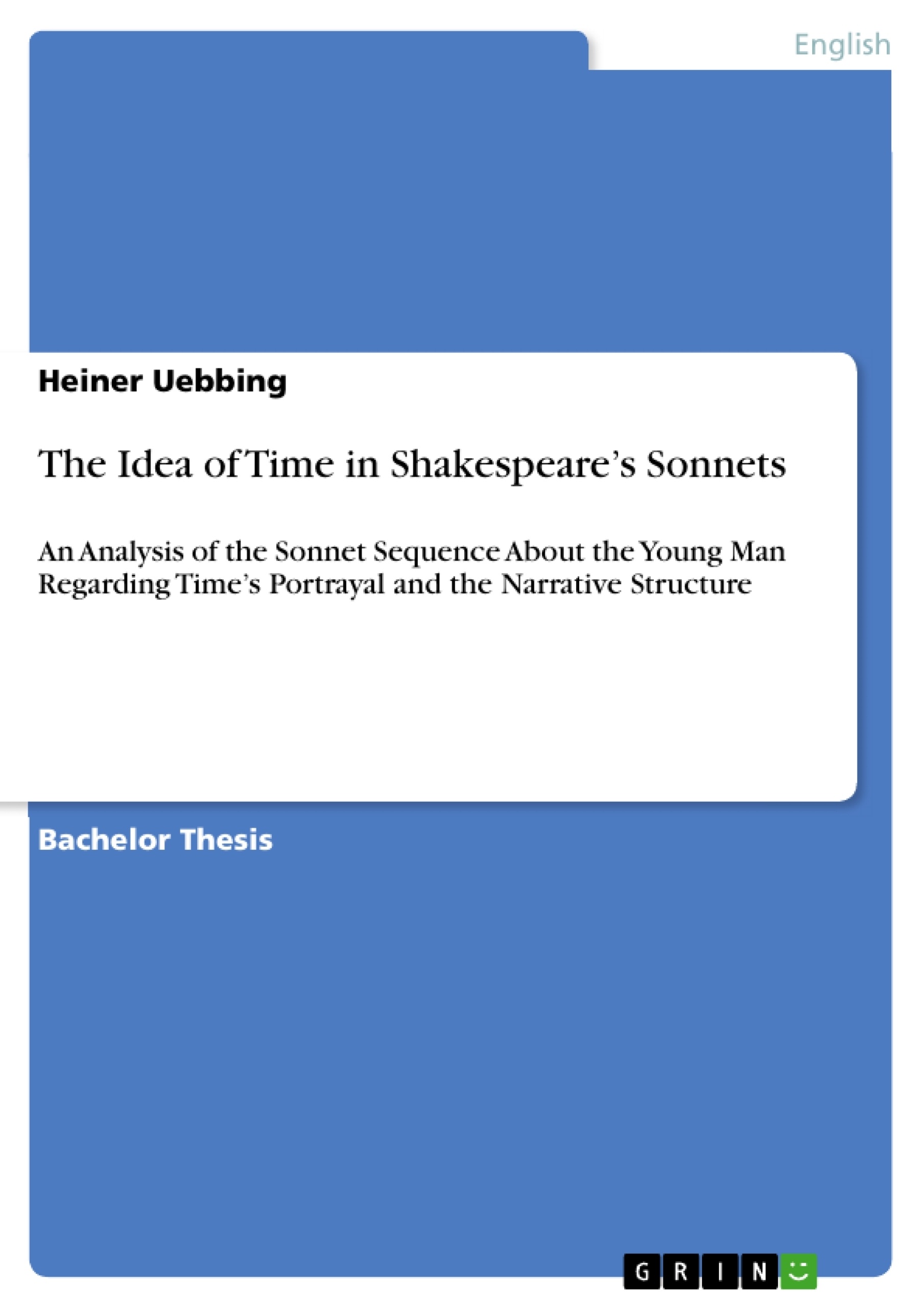
The Idea of Time in Shakespeare’s Sonnets
Bachelorarbeit, 2014
37 Seiten, Note: 1,6
Leseprobe
Table of Contents
- Introduction
- 1 Immortalisation of Beauty Through Procreation
- 1.1 Sonnet 5
- 1.2 Sonnet 12
- 1.3 Sonnet 15
- 2 Verse as a Means to Defeat Time
- 2.1 Sonnet 19
- 2.2 Sonnet 60
- 2.3 Sonnet 63
- 2.4 Sonnet 64
- 3 Paradigm Shift in Regard to the Idea of Time
- 3.1 Sonnet 123
- 3.2 Sonnet 124
- 3.3 Sonnet 126
- Conclusion
Objectives and Key Themes
This thesis analyses the concept of time and its personified portrayal as an antagonist in Shakespeare's sonnets dedicated to the young man. It explores the narrative structure of the sonnets, focusing on the interplay between the poet, time, and the young friend as they engage in a battle against the destructive forces of time. The thesis delves into the poet's various attempts to preserve the friend's beauty, including procreation, immortalisation through verse, and ultimately, a shift in perspective on time itself.
- The personification of time as a destructive force
- The poet's efforts to preserve the young man's beauty
- The narrative structure of the sonnet sequence
- The role of procreation in preserving beauty
- The power of verse to immortalise
Chapter Summaries
The first chapter examines the procreation sequence of sonnets, focusing on the poet's initial strategy to preserve the young friend's beauty by urging him to procreate. Sonnet 5, in particular, highlights the destructive nature of time and its ability to diminish beauty. The chapter analyzes how the poet grapples with the transient nature of beauty and its vulnerability to time's relentless passage.
The second chapter delves into the poet's attempt to immortalize the young man's beauty through verse. Sonnet 19 explores the power of poetry to overcome the limitations of time. This chapter examines how the poet seeks to transcend the ephemeral nature of physical beauty by capturing it in the enduring medium of verse.
The third chapter analyzes the sonnets where the poet undergoes a paradigm shift in his understanding of time. Sonnet 123 marks a turning point in the poet's perspective as he acknowledges the inevitability of time's passage and its impact on both beauty and life itself.
Keywords
This thesis explores the concept of time in Shakespeare's sonnets, focusing on the themes of beauty, preservation, time as antagonist, narrative structure, procreation, and verse as a means to immortalise. It examines the relationship between the poet, time, and the young friend and how their interactions shape the sonnet sequence.
Details
- Titel
- The Idea of Time in Shakespeare’s Sonnets
- Untertitel
- An Analysis of the Sonnet Sequence About the Young Man Regarding Time’s Portrayal and the Narrative Structure
- Hochschule
- Universität Leipzig (Anglistics)
- Note
- 1,6
- Autor
- Heiner Uebbing (Autor:in)
- Erscheinungsjahr
- 2014
- Seiten
- 37
- Katalognummer
- V1141979
- ISBN (eBook)
- 9783346520166
- ISBN (Buch)
- 9783346520173
- Sprache
- Englisch
- Schlagworte
- idea time shakespeare’s sonnets analysis sonnet sequence about young regarding time’s portrayal narrative structure
- Produktsicherheit
- GRIN Publishing GmbH
- Preis (Ebook)
- US$ 17,99
- Preis (Book)
- US$ 19,99
- Arbeit zitieren
- Heiner Uebbing (Autor:in), 2014, The Idea of Time in Shakespeare’s Sonnets, München, Page::Imprint:: GRINVerlagOHG, https://www.diplomarbeiten24.de/document/1141979
- Autor werden
- Ihre Optionen
- Vertriebskanäle
- Premium Services
- Autorenprofil
- Textarten und Formate
- Services für Verlage, Hochschulen, Unternehmen

- © GRIN Publishing GmbH.
- Alle Inhalte urheberrechtlich geschützt. Kopieren und verbreiten untersagt.
- info@grin.com
- AGB
- Open Publishing
Der GRIN Verlag hat sich seit 1998 auf die Veröffentlichung akademischer eBooks und Bücher spezialisiert. Der GRIN Verlag steht damit als erstes Unternehmen für User Generated Quality Content. Die Verlagsseiten GRIN.com, Hausarbeiten.de und Diplomarbeiten24 bieten für Hochschullehrer, Absolventen und Studenten die ideale Plattform, wissenschaftliche Texte wie Hausarbeiten, Referate, Bachelorarbeiten, Masterarbeiten, Diplomarbeiten, Dissertationen und wissenschaftliche Aufsätze einem breiten Publikum zu präsentieren.
Kostenfreie Veröffentlichung: Hausarbeit, Bachelorarbeit, Diplomarbeit, Dissertation, Masterarbeit, Interpretation oder Referat jetzt veröffentlichen!
- GRIN Verlag GmbH
-
- Nymphenburger Str. 86
- 80636
- Munich, Deutschland
- +49 89-550559-0
- +49 89-550559-10
- info@grin.com
-









